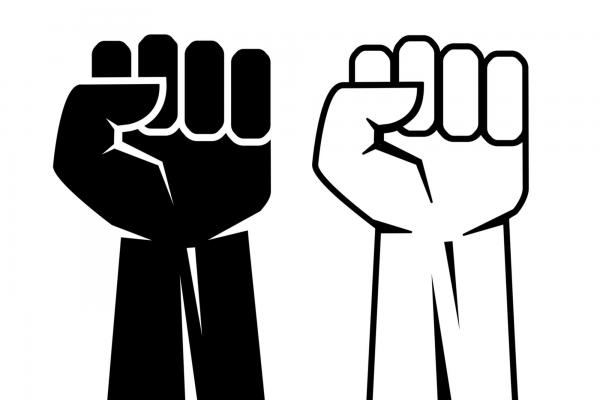Author's Note: I'm writing this in hopes that it can be used to lighten the load of marginalized folks, keeping in mind that not all marginalized people want to engage in the ally conversation, and that is perfect as well. For those who do, my prayer is that when someone asks you the question, “how can I be a stronger ally?” you might choose to save your breath/energy and send this in its place.
I have been asked by two dear friends, “how can I be a stronger ally?” Being the slow emotional processor that I am, I wanted to spend some time with this before I answered them. I surely appreciate and love these two individuals, and I appreciate their vulnerability in asking me this question.
I am not going to do much coddling here; I don’t know that I believe that love requires coddling. Here are six things you can do to be stronger allies.
1. Listen more; talk less. You don’t have to have something to say all of the time. You don’t have to post something on social media that points to how liberal/how aware/how cool/how good you are. You are lovely, human, and amazing. You have also had the microphone for most of the time, for a very long time, and it will be good to give the microphone to someone else who is living a different experience than your own.
2. For one out of every three opinions/insights shared by a person of color in your life, try to resist the need to respond with a better or different insight about something that you read or listened to as it relates to their shared opinion. Try just to listen and sit with someone else’s experience. When you do share in response to what someone has shared with you, it can sometimes (not always) feel like “whitesplaining” — meaning to explain or comment on something in an over-confident or condescending way. This adds to the silencing of the voices of people of color.
3. Being an ally is different than simply wanting not to be racist (thank you for that, by the way). Being an ally requires you to educate yourself about systemic racism in this country. Read Michelle Alexander’s The New Jim Crow and Ta-Nehisi Coates’ Between the World and Me and Claudia Rankine’s Citizen and so many other great books and articles that illuminate oppression and structures of white supremacy and white privilege. Use your voice and influence to direct the folks that walk alongside you in real life (or follow you on the internet), toward the voice of someone that is living a marginalized/disenfranchised experience.
4. Please try not to, “I can’t believe that something like this would happen in this day and age!” your way into being an ally when atrocities like the events in Charleston, S.C., and Charlottesville, Va., happen. People of color have been aware of this kind of hatred and violence in America for centuries, and it belittles our experience for you to show up 300 years late to the oppression-party suddenly caring about the world. Don’t get me wrong, I welcome you. I want for you to come into a place of awareness. However, your shock and outrage at the existence of racism in America echoes the fact that you have lived an entire life with the luxury of indifference about the lives of marginalized/disenfranchised folks. Please take several seats.
5. Ask when you don’t know — but do the work first. This is nuanced. Some marginalized/disenfranchised folks will tell you not to ask them anything; don’t be offended by that. Folks are tired, and that is understandable because it is exhausting to be a marginalized person in this world. However, there is something special that happens within human connections and relationships. In a nutshell, don’t expect for people to educate you. Do the work to educate yourself. Ask questions within relationships that feel safe, and do so respectfully.
6. And finally, stop talking about colorblindness. It’s not a thing. Colorblindness is totally impossible in a nation whose land was taken from the indigenous inhabitants through an attempt at genocide and horrific colonization. The same nation that enslaved humans and exploited them in every way imaginable built a nation on their backs, hung them, hunted them, and for centuries kept them from their basic inalienable rights and still does. The same nation that exploits and deports immigrants who were promised refuge within the American Constitution. The same nation that incarcerated Japanese Americans during World War II and continues to promote bigotry, exclusion, and violence against LGBTQ/gender non-identifying folks. This nation that allows swastika-wearing, Confederate-flag-toting, anti-Semitic racists to have a platform for their hate. The same nation that promised religious freedom, yet targets those who do not believe in a white, capitalist Jesus.
I love Jesus. And promise, Jesus was not white (literally brown, and wonderfully Jewish) and would have never been a capitalist.
It will never be possible for us to be colorblind, and we shouldn’t ever want to be.
I heard a saying once at an Al-Anon meeting that offered me liberation: “We are only as sick as our secrets (and our shame).” Shame can only live in the darkness; it can live within the systems of denial and defensiveness that we use to cover it up. We have to name these things, acknowledge them, and begin to do the deep work of transformation, restoration — and reparation.
Yup, now I’m talking about reparations.
Privilege means that you owe a debt. You were born with it. You didn’t ask for it. And you didn’t pay for it either. No one is blaming you for having it. You are lovely, human, and amazing. Being a citizen of a society requires work from everyone within that society. It is up to you whether you choose to acknowledge the work that is yours to do. It is up to you whether you choose to pay this debt and how you choose to do so.
Sometimes living with privilege can disillusion us into thinking that being in community with other humans doesn’t require work. This is a lie; it requires a great deal of work. And all of that work requires being a human and trying to love other humans well.
I believe that this is holy work, the work of justice, the pursuit of it. It doesn’t need an audience, and it will not always have one. It will happen most days in ways that are unseen. It might mean providing a meal or shelter, listening, using your particular area of expertise to help someone in need of that expertise who might not have access to it otherwise, bailing a protester out of jail, or paying a family’s rent one month (if you have the resources to do so), or marching at a rally with marginalized folks alongside other allies. There may not always be a practical, tangible way to pursue this work, but I believe you will know it when you meet it face-to-face.
However it looks, it will be something that you do without needing to be thanked or receive praise — you are not a savior. Marginalized/disenfranchised folks can and will survive without you — we are magic. However, I urge you to pursue this work, knowing that a system of white privilege afforded you access to opportunities while denying them to so many others.
Above all, I urge you keep trying. You're going to make mistakes; expect this. But keep showing up. Be compassionate. Lead with empathy, always. Keep learning and growing. If you do this, I truly believe you’ll be doing the work of an ally.
Please keep in mind that self care is hugely important. Take care of yourself and protect your energy before you attempt to care for anyone else.
Some additional resources:
- Article: “White Debt” by Eula Biss. New York Times, 2015.
- Podcast: On Being with Krista Tippett: Eula Biss, “Let’s Talk About Whiteness”. 2017.
Got something to say about what you're reading? We value your feedback!







